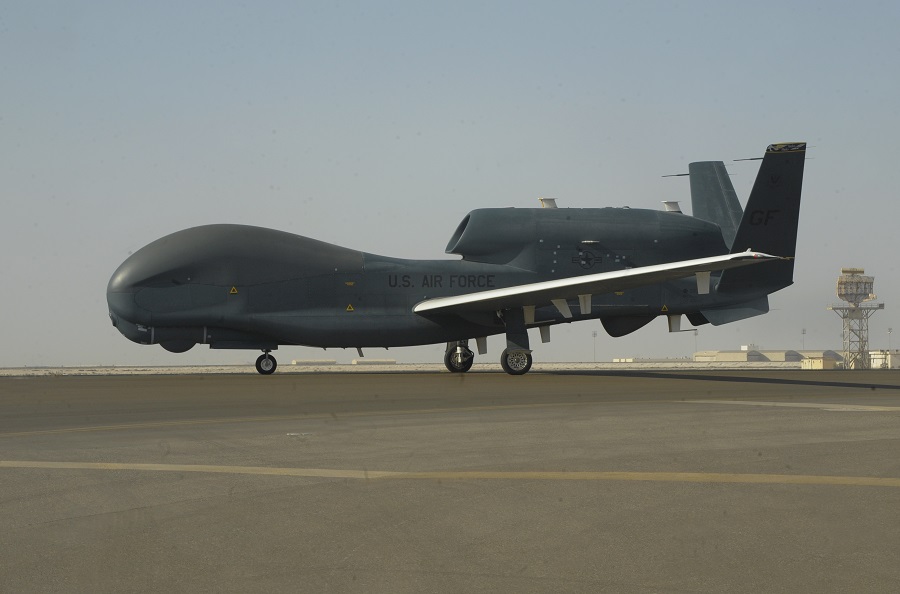DUBAI: Donald Trump warned Iran it had made a ‘very big mistake’ in shooting down a US drone near the Strait of Hormuz Thursday.
The US said the RQ-4 Global Hawk surveillance drone was shot down in international airspace near the shipping lane through which a fifth of the world’s crude oil passes.
Iran’s Islamic Revolutionary Guard Corps (IRGC) claimed the drone had been shot down in Iranian airspace.
The US military‘s Central Command released a statement calling the downing an “unprovoked attack.”

The RQ-4A Global Hawk is used for surveillance and reconnaissance missions. (File/AP)
“They made a very big mistake,” Trump said. “This country will not stand for it, that I can tell you.” The US president also raised some doubt over who ordered the strike saying: “I would imagine it was a general or somebody that made a mistake in shooting that drone down.”
But he added that it would have been far more serious had it been a piloted aircraft. “We had nobody in the drone. It would have made a big difference, let me tell you, it would have made a big, big difference,” he said.
The Trump administration called top congressional leaders to the White House for a briefing later on Thursday.
The incident is the latest in a string of provocations blamed on Tehran as tensions with the US continue to increase. On Wednesday, the US said it had intelligence that proved “without question” that Iran had attacked two tankers in the Gulf of Oman last week after they passed through the Strait of Hormuz.
Saudi Arabia’s Minister of State for Foreign Affairs Adel Al-Jubeir, said Iran had created a grave situation with its “aggressive behavior” and the Kingdom was consulting other Gulf Arab states on next steps.
“When you interfere with international shipping it has an impact on the supply of energy, it has an impact on the price of oil which has an impact on the world economy. It essentially affects almost every person on the globe,” Adel Al-Jubeir, Saudi minister of state for foreign affairs, told reporters in London.
Iran made a very big mistake!
— Donald J. Trump (@realDonaldTrump) June 20, 2019
Iran has repeatedly threatened to close the Strait of Hormuz, and Al-Jubeir said any attempt to do so would provoke a “very, very strong reaction.”
Bahrain, which hosts a base for the US Navy's Fifth Fleet, described the incident as “a cowardly act of aggression.”
The CENTCOM statement said the maritime surveillance drone was shot down by an Iranian surface-to-air missile.
“Iranian reports that the aircraft was over Iran are false,” CENTCOM said, adding that “this was an unprovoked attack on a U.S. surveillance asset in international airspace.”
The drone was downed at approximately 2335 GMT - in the early morning hours of local time in the Gulf.
The IRGC, which answers only to Supreme Leader Ayatollah Ali Khamenei, claimed it shot down the drone when it entered Iranian airspace near the Kouhmobarak district in southern Iran’s Hormozgan province, close to the Strait of Hormuz.
“Borders are our red line,” IRGC commander Gen. Hossein Salami said. “Any enemy that violates the borders will be annihilated.”
Iran said Friday that it had “indisputable” evidence that a US drone it shot down this week had violated its airspace.
Deputy foreign minister Abbas Araghchi told Swiss ambassador, Markus Leitner, whose country represents US interests in Iran, of the evidence on Thursday night, the foreign ministry said in a statement.
“Even some parts of the drone’s wreckage have been retrieved from Iran’s territorial waters,” Araghchi told the Swiss envoy.”
Russian President Vladimir Putin called for caution, warning any war between Iran and the US would be a “catastrophe for the region as a minimum.”
The RQ-4 Global Hawk, which cost over $100 million apiece and can fly higher than 10 miles in altitude and stay in the air for over 24 hours at a time. They have a distinguishable hump-shaped front and an engine atop. Their wingspan is bigger than a Boeing 737 passenger jet.
The attacks come against the backdrop of heightened tensions between the US and Iran following Trump’s decision last year to withdraw from a deal to curb Iran’s nuclear program.
The US has ramped up sanctions that have drastically reduced Tehran’s oil exports as it moves to isolate Iran over its nuclear and ballistic missile program and role in regional wars.
Since mid-May, explosive strikes blamed on Iran have hit six oil tankers. The US has sped an aircraft carrier to the Mideast and deployed additional troops alongside the tens of thousands already in the region.
Global jitters about a new Middle East conflagration disrupting oil exports have triggered a jump in crude prices. They surged by more than $3 to above $63 a barrel on Thursday.
Iran has claimed to have shot down American drones in the past. In the most-famous incident, in December 2011, Iran seized an RQ-170 Sentinel flown by the CIA to monitor Iranian nuclear sites after it entered Iranian airspace from neighboring Afghanistan.
*With AP and Reuters





























